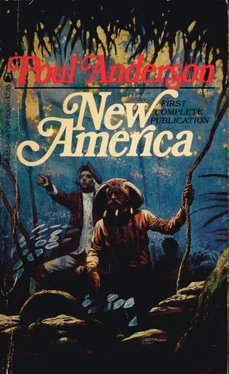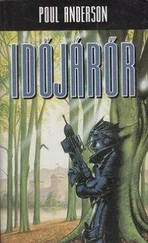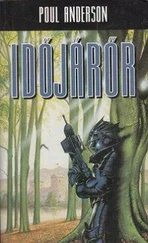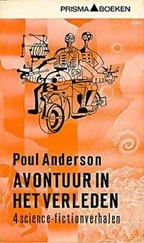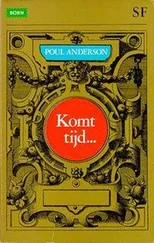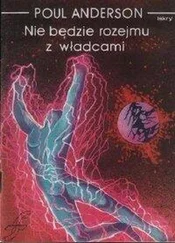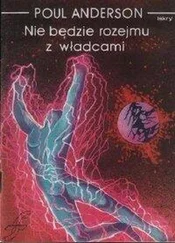The man broke off. Unease crossed his features. “Best we go to sleep,” he said. “We’ve a long distance to cover in the morning.”
She looked outward. “Here is no morning.”
They retired. Mistherd rose and cautiously flexed limberness back into his muscles. Before returning to the Sister of Lyrth, he risked a glance through a pane in the car. Bunks were made up, side by side, and the humans lay in them. Yet the man had not touched her, though hers was a bonny body, and nothing that had passed between them suggested he meant to do so.
Eldritch, humans. Cold and claylike. And they would overrun the beautiful wild world? Mistherd spat in disgust. It must not happen. It would not happen. She who reigned had vowed that.
The lands of William Irons were immense. But this was because a barony was required to support him, his kin and cattle, on native crops whose cultivation was still poorly understood. He raised some Terrestrial plants as well, by summerlight and in conservatories. However, these were a luxury. The true conquest of northern Arctica lay in yerba hay, in bathyrhiza wood, in pericoup and glycophyllon, and eventually, when the market had expanded with population and industry, in chalcanthemum for city florists and pelts of cage-bred rover for city furriers.
That was in a tomorrow Irons did not expect that he would live to see. Sherrinford wondered if the man really expected anyone ever would.
The room was warm and bright. Cheerfulness crackled in the fireplace. Light from fluoropanels gleamed off hand-carven chests and chairs and tables, off colorful draperies and shelved dishes. The outwayer sat solid in his high seat, stoutly clad, beard flowing down his chest. His wife and daughters brought coffee, whose fragrance joined the remnant odors of a hearty supper, to him, his guests, and his sons.
But outside, wind hooted, lightning flared, thunder bawled, rain crashed on roof and walls and roared down to swirl among the courtyard cobblestones. Sheds and barns crouched against hugeness beyond. Trees groaned, and did a wicked undertone of laughter run beneath the lowing of a frightened cow? A burst of hailstones hit the tiles like knocking knuckles.
You could feel how distant your neighbors were, Sherrinford thought. And nonetheless they were the people whom you saw oftenest, did daily business with by visiphone (when a solar storm didn’t make gibberish of their voices and chaos of their faces) or in the flesh, partied with, gossiped and intrigued with, intermarried with; in the end, they were the people who would bury you. The lights of the coastal towns were monstrously farther away.
William Irons was a strong man. Yet when now he spoke, fear was in his tone. “You’d truly go over Troll Scarp?”
“Do you mean Hanstein Palisades?” Sherrinford responded, more challenge than question.
“No outwayer calls it anything but Troll Scarp,” Barbro said.
And how had a name like that been reborn, light-years and centuries from Earth’s Dark Ages?
“Hunters, trappers, prospectors—rangers, you call them—travel in those mountains,” Sherrinford declared.
“In certain parts,” Irons said. “That’s allowed, by a pact once made ‘tween a man and the Queen after he’d done well by a jack-o’-the-hill that a satan had hurt. Wherever the plumablanca grows, men may fare, if they leave man-goods on the altar boulders in payment for what they take out of the land. Elsewhere—” one fist clenched on a chair arm and went slack again—“‘s not wise to go.”
“It’s been done, hasn’t it?”
“Oh, yes. And some came back all right, or so they claimed, though I’ve heard they were never lucky afterward. And some didn’t; they vanished. And some who returned babbled of wonders and horrors, and stayed witlings the rest of their lives. Not for a long time has anybody been rash enough to break the pact and overtread the bounds.” Irons looked at Barbro almost entreatingly. His woman and children stared likewise, grown still. Wind hooted beyond the walls and rattled the storm shutters. “Don’t you.”
“I’ve reason to believe my son is there,” she answered.
“Yes, yes, you’ve told and I’m sorry. Maybe something can be done. I don’t know what, but I’d be glad to, oh, lay a double offering on Unvar’s Barrow this midwinter, and a prayer drawn in the turf by a flint knife. Maybe they’ll return him.” Irons sighed. “They’ve not done such a thing in man’s memory, though. And he could have a worse lot. I’ve glimpsed them myself, speeding madcap through twilight. They seem happier than we are. Might be no kindness, sending your boy home again.”
“Like in the Arvid song,” said his wife.
Irons nodded. “M-hm. Or others, come to think of it.”
“What’s this?” Sherrinford asked. More sharply than before, he felt himself a stranger. He was a child of cities and technics, above all a child of the skeptical intelligence. This family believed . It was disquieting to see more than a touch of their acceptance in Barbro’s slow nod.
“We have the same ballad in Olga Ivanoff Land,” she told him, her voice less calm than the words. “It’s one of the traditional ones—nobody knows who composed them—that are sung to set the measure of a ring-dance in a meadow.”
“I noticed a multilyre in your baggage, Mrs. Cullen,” said the wife of Irons. She was obviously eager to get off the explosive topic of a venture in defiance of the Old Folk. A songfest could help. “Would you like to entertain us?”
Barbro shook her head, white around the nostrils. The oldest boy said quickly, rather importantly, “Well, sure, I can, if our guests would like to hear.”
“I’d enjoy that, thank you.” Sherrinford leaned back in his seat and stoked his pipe. If this had not happened spontaneously, he would have guided the conversation toward a similar outcome.
In the past he had had no incentive to study the folklore of the outway, and not much chance to read the scanty references on it since Barbro brought him her trouble. Yet more and more he was becoming convinced that he must get an understanding—not an anthropological study, but a feel from the inside out—of the relationship between Roland’s frontiersmen and those beings which haunted them.
A bustling followed, rearrangement, settling down to listen, coffee cups refilled and brandy offered on the side. The boy explained, “The last line is the chorus. Everybody join in, right?” Clearly he too hoped thus to bleed off some of the tension. Catharsis through music? Sherrinford wondered, and added to himself: No; exorcism.
A girl strummed a guitar. The boy sang, to a melody which beat across the storm noise:
“It was the ranger Arvid
rode homeward through the hills
among the shadowy shiverleafs,
along the chiming rills.
The dance weaves under the firethorn.
“The night wind whispered around him
with scent of brok and rue.
Both moons rose high above him
and hills aflash with dew.
The dance weaves under the firethorn.
“And dreaming of that woman
who waited in the sun,
he stopped, amazed by starlight,
and so he was undone.
The dance weaves under the firethorn.
“For there beneath a barrow
that bulked athwart a moon,
the Outling folk were dancing
in glass and golden shoon.
The dance weaves under the firethorn.
“The Outling folk were dancing
like water, wind, and fire
to frosty-ringing harpstrings,
and never did they tire.
The dance weaves under the firethorn.
“To Arvid came she striding
from whence she watched the dance,
the Queen of Air and Darkness,
with starlight in her glance.
The dance weaves under the firethorn.
Читать дальше
